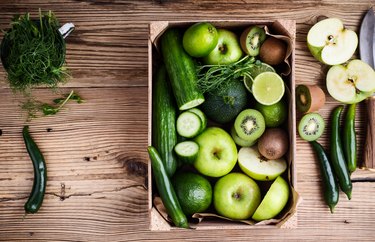
Learning the percentage of water in fruits and vegetables may be more important than satisfying mere curiosity. Besides their many nutritional benefits, boosting your water intake another good reason to eat your daily fruits and vegetables.
Read more: The Benefits of Electrolytes in Water
Video of the Day
Video of the Day
Percentage of Water in Fruits
According to the USDA, a whole host of different fruits have very high water content.
If you've ever enjoyed a wedge of fresh watermelon, you're familiar with its refreshing juiciness, which is due to its water content. This fruit is No. 1 in water content. Other fruits that are more than 90 percent water include strawberries, grapefruit and cantaloupe.
Peaches, Asian pears, blackberries, papaya, nectarines, plums, oranges, apricots, pineapple, raspberries, apples, blueberries and mangos are all more than 80 percent water.
Include These High-Water Vegetables
A variety of vegetables have a composition that's 89 percent water or more, according to the USDA.
These include lettuce, celery, bok choy, radishes, cucumber, zucchini, watercress, tomatoes, green bell peppers, asparagus, portabella mushrooms, Swiss chard, okra, cabbage, cauliflower, broccoli and spinach.
High Water, Low Calories
In addition to replenishing your body's fluids, the water in fruits and vegetables contributes one of two factors that make them such good choices for weight management. Water and fiber add bulk, yet don't contain calories.
A higher percentage of both results in foods with fewer calories per portion. In other words, you won't consume too many calories when you eat a normal — and filling — portion.
According to the Mayo Clinic, foods with high water content have lower energy density, meaning you can eat larger amounts of them while consuming fewer calories. The ability to actually eat a satisfying amount of healthy food while losing weight, versus limiting portions to restrict calories, facilitates weight loss.
Keep Yourself Hydrated
Not having enough water in your body, a condition called dehydration, can lead to serious health issues.
Symptoms of mild dehydration include dry lips and mouth. Moderate dehydration can lead to dizziness, lightheadedness, headache, reduced urine output, fatigue and muscle weakness or cramping. In severe cases, dehydration can lead to irritability, confusion, lack of sweating, rapid heart rate, fast breathing, cold hands, fever, blue lips and little to no urine output.
Read more: The Consequences of a Lack of Water
Meet Your Water Requirements
Electrolytes, such as sodium and potassium, must dissolve in water before they can trigger muscle contractions and nerve impulses, according to the Mayo Clinic. Water helps regulate body temperature, protects your brain, cushions joints, transports nutrients and impacts blood volume.
The amount of water you need to consume changes depending on your activity level, the temperature and whether you're losing excess water through sweat or urine. Under normal circumstances, women need 2.7 liters, and men should consume 3.7 liters of water daily, according to the National Academies for Sciences. This recommended intake includes the water you get from foods.